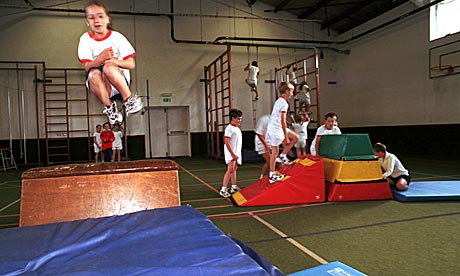
Spending too much time in front of television, DVDs and computer games is taking its toll on children's physical and mental health, according to a government-commissioned report published on Wednesday.
Public Health England says there is evidence that children who spend more time watching screens tend to have higher levels of emotional distress, anxiety and depression.
The agency, which is using the data as the basis of a campaign to encourage families to adopt healthier behaviour, claims over 70% of young people did not undertake the recommended daily hour of physical activity.
The research echoes concerns raised by doctors last week that children's lack of exercise was leading to more unhealthy lifestyles. A third of 11-year-olds are now either overweight or obese.
The proportion of young people with a low estimation of their own wellbeing almost doubles from 14% to 24% between 11 and 15, according to the independent NatCen Social Research organisation, which presented new analysis of a broad set of data for the Department of Health.
Young people who spent less than one hour a day playing computer games were almost three times more likely to say they enjoyed good wellbeing as those who played four hours or more, according to the research.
Similarly those who shared an evening meal with their family on at least six days a week were more likely to be happy about their circumstances.
Government health leaders are using such evidence, only the latest in a growing library, to bolster their message that more physical activity will make children more likely to concentrate in school, enjoy better relationships with classmates and be less worried, anxious or depressed.
The latest report uses data from the Millenium Cohort study of children born in 2000 by the Institute of Education in London, and the UK Household Longitudinal Study, led by Essex University. It was commissioned by the Department of Health in England to inform public health policy and help its executive agency Public Health England (PHE) and local councils deliver the Change4Life programme, a key element in official attempts to "nudge" rather than dictate behavioural change in the population.
PHE is launching a new TV, smartphone and online campaign to encourage families to swap car or bus journeys for walking, scooting or cycling, build 10-minute slots of physical activity into at least an hour of physical exertion a day, limit screen time, swap unhealthy treats for healthy alternatives and eat more healthy lunches.
On one example, a mother is seen reaching into a cartoon-like doll's house to throw a pink animated figure out of bed, along with their pizza and crisps, and remove a blue figure from the couch in front of the TV. A voiceover says: "Summer holidays! Our kids thought they were great. But great for their health? I don't think so."
Kevin Fenton, PHE's director of health and wellbeing, said: "There are many complex factors that affect a child's wellbeing such as the wider environment they live in and their social, financial and family circumstances, but there are also some very simple things we can do to help improve their health and wellbeing."
Other evidence being cited by the PHE includes a recent Unicef report which put the UK 16th among 29 of the world's richest countries for children's wellbeing.
It said 62% of 11-year-olds, 71% of 13-year-olds and 68% of 15-year-olds reported watching more than two hours of TV every weekday, compared with Switzerland where the figure was less than 35% across all three age groups. In England, the proportion of young people playing computer games for two hours or more a night increased from 42% to 55% among boys and 14% to 20% among girls between 2006 and 2010, said the WHO's survey on health behaviour in school-aged children.
Lil Caprani, director of communication, policy and campaigns at the Children's Society, which recently found half a million children in the UK were "struggling with their lives", said: "We found a strong association with being active and being happy. Things like cycling, swimming or playing football all had a clear relationship, but simple things like just going for walks were associated with higher wellbeing."
The launch of the new campaign coincided with an announcement by broadcasting regulator Ofcom that it is to commission new research into whether children and young people under 18 are watching "potentially harmful" content after finding Channel Four broke broadcasting rules by airing a violent train death before the 9pm TV watershed.

